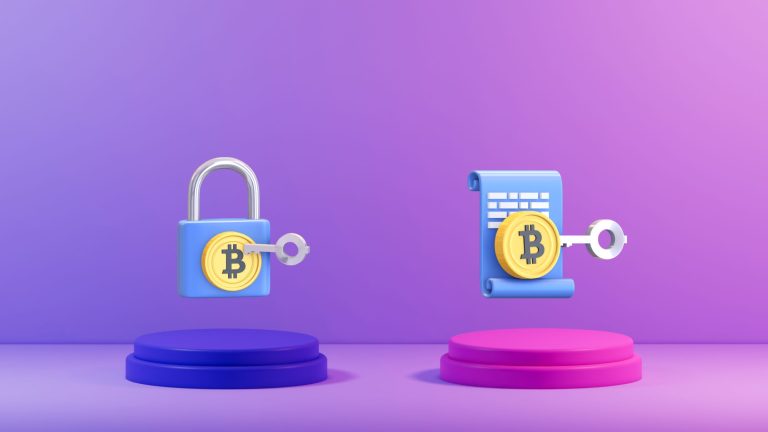In the world of cryptocurrency, private keys and seed phrases are critical components for managing and safeguarding digital assets. While both are integral to accessing and securing funds, they serve distinct purposes and require different management strategies.
Understanding the differences between private keys and seed phrases is fundamental for anyone involved in crypto, as they play a key role in ensuring the security and accessibility of digital assets. This article explores what these concepts mean, how they work, and best practices for keeping them secure.
Key Insights
- A private key is a unique cryptographic code that allows users to access and authorize transactions for their cryptocurrency. It’s confidential and essential for daily operations, ensuring secure control over funds.
- A seed phrase, often 12, 18, or 24 simple words, acts as a recovery tool for an entire wallet. It’s a user-friendly way to restore access to funds and private keys in case of device loss or failure.
- Private keys are used for everyday transactions, while seed phrases serve as a recovery mechanism. Losing a private key can lead to inaccessible funds unless a seed phrase backup exists.
- Use hardware wallets, write down seed phrases on offline materials, avoid cloud storage, and never share either private keys or seed phrases. These practices safeguard your assets from unauthorized access and loss.
What is a Private Key?
A private key is a unique cryptographic code that enables the holder to access their cryptocurrency and authorize transactions. It functions as the digital equivalent of a password, ensuring that only the owner can transfer or spend the funds stored in their wallet.
Key Characteristics of a Private Key
- Format: A long string of alphanumeric characters, making it highly secure but difficult to remember.
- Functionality: Paired with a public key, which is used to receive funds, while the private key remains confidential to secure access.
- Critical Role: Acts as the primary mechanism for signing and authorizing transactions.
Example of a Private Key:
5J76tNdk9f87yU9fL7v9DXa1UbF7ghD9zp5RZ1Yr5S8pTqVzBjT
What is a Seed Phrase?
A seed phrase, also known as a recovery phrase or mnemonic phrase, is a set of randomly generated words that act as a backup for your wallet. It is a human-readable representation of the private key data, allowing users to restore access to their wallet in case of loss or device failure.
Key Characteristics of a Seed Phrase
- Format: A collection of 12, 18, or 24 simple words, making it easier to record and remember than a private key.
- Functionality: Used to regenerate all private and public keys associated with a wallet.
- Role: Provides a complete recovery solution for the wallet, including all assets and keys.
Example of a Seed Phrase:
cat maple key green swim bubble near jump calm river stone toast
Differences Between Private Keys and Seed Phrases
While both private keys and seed phrases are crucial for managing cryptocurrency, they serve different purposes.
1. Purpose and Function
- Private Key: Authorizes and signs transactions, giving direct access to funds.
- Seed Phrase: Acts as a backup to restore an entire wallet.
2. Format
- Private Key: A long, complex alphanumeric string.
- Seed Phrase: A series of simple, human-readable words.
3. Recoverability
- Private Key: If lost, funds are inaccessible unless a backup exists.
- Seed Phrase: Allows recovery of all private keys and assets in a wallet.
4. Usage
- Private Key: Confidential and used for everyday transactions.
- Seed Phrase: Used only for recovery purposes, not for daily operations.
Best Practices for Securing Private Keys and Seed Phrases
Both private keys and seed phrases require secure management to protect against unauthorized access or loss. Here are some tips for keeping them safe:
1. Never Share Them
Both private keys and seed phrases should remain confidential. Sharing them exposes your assets to theft.
2. Use a Hardware Wallet
Store private keys offline using a hardware wallet. These devices provide an extra layer of security against online threats.
3. Write Down the Seed Phrase
Record your seed phrase on physical paper or a fireproof material. Store it in a secure, offline location to prevent unauthorized access.
4. Avoid Cloud Storage
Storing private keys or seed phrases in the cloud increases vulnerability to hacking. Use offline storage methods instead.
5. Consider Multi-Signature Wallets
For enhanced security, multi-signature wallets require multiple private keys to authorize transactions, distributing risk and reducing the likelihood of unauthorized access.
Why Private Keys and Seed Phrases Are Both Essential
Private Keys
Private keys are the gateway to accessing and managing funds. Without them, transactions cannot be authorized, making them indispensable for day-to-day crypto operations.
Seed Phrases
Seed phrases provide a safety net for users, allowing them to restore their wallet and access funds if the private key is lost.
Together, these tools ensure that crypto assets are both accessible and secure. By understanding their roles and managing them responsibly, users can mitigate risks and maintain control over their investments.
Final Thoughts on Private Keys and Seed Phrases
In the crypto world, security is non-negotiable. Both private keys and seed phrases play critical roles in safeguarding assets, and understanding their differences is essential for any crypto user.
By implementing best practices for managing private keys and seed phrases—such as using hardware wallets, avoiding online storage, and keeping recovery phrases secure—users can navigate the digital asset space with confidence.
With proper security measures in place, crypto investors can ensure that their assets remain safe and accessible, no matter what challenges arise.
Follow Our Official Social Channels:
